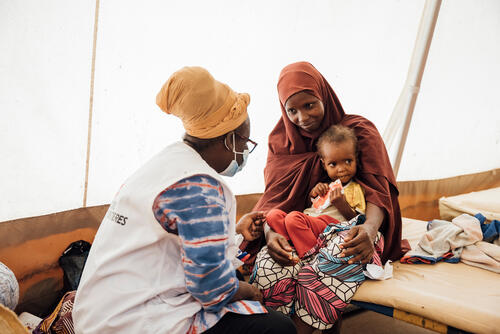As the world slowly emerged from the havoc caused by the COVID-19 pandemic, Médecins Sans Frontières (MSF) pulled together to respond to new emergencies in 2022, while continuing to assist communities affected by longstanding crises.
After a full-scale attack on Ukraine in February, the tragedy of bloody warfare became the new normal for millions of people. In this perilous and ever-evolving conflict, we strove to find where we could be most useful, to support people caught in precarious circumstances and provide healthcare where needed.
The ripple effects of the war in Ukraine had consequences far beyond Europe, in part intensifying other, less-reported crises. Across continents, economic crises, combined with a lack of food and a surge in diseases, such as measles and cholera, left millions of children vulnerable to malnutrition, and caused hundreds of thousands of preventable deaths.
In the Sahel region of Africa, consecutive droughts, vicious conflict, mass displacement and a lack of access to healthcare also contributed to alarming levels of malnutrition in 2022. Meanwhile in North West region, Nigeria, a chronically food-insecure area, escalating violence forced half a million people to flee their homes. Many were unable to farm, and lost their livelihoods. By September, our teams had treated more than 100,000 children for acute malnutrition in North West region alone.
In Somalia, the situation was similarly bleak, as the worst drought in 40 years caused a desperate shortage of food. Between January and August, our teams were treating approximately 500 acutely malnourished children a week.
To make matters worse, infectious diseases, such as cholera and measles, spread rapidly among malnourished communities, creating a vicious cycle, as a malnourished person is more susceptible to infection, and infection contributes to malnutrition. With increasing insecurity, climate change and global inflation of food prices, a massive response was required; however, the necessary scale-up did not meet the needs of many communities in vulnerable circumstances.
At the same time, balancing our duty of care with keeping our staff safe proved to be extremely complicated. In the Central African Republic and South Sudan, we lost three colleagues in brutal killings, while in Cameroon, several staff members were detained on false charges for extended periods of time before being released. In some cases, this insecurity hampered our ability to reach people most in need, and in others forced us to close projects.
The challenges we faced last year were not only external; while striving to become the MSF we want to be, we were also forced to look more deeply within. In February, we released a progress report on our commitments to tackle institutional discrimination and racism within MSF.
Although we set out a clear blueprint, focusing on seven specific areas that needed urgent and concrete action – from management of abuse and misbehaviour to safety and security – it did not cover all the issues that we needed to address.
This became clear last year, during a transformative moment in our treatment of imagery at MSF. We were compelled to address sensitive photography involving patients in our care. Among the issues highlighted was our decision to publish identifiable photographs of a 16-year-old girl who was the victim of rape in Ituri, Democratic Republic of Congo. We acknowledge that the publication of these images was a mistake, but being sorry is not enough.
The scrutiny that followed was right and appropriate, prompting us to take immediate action, including the removal of sensitive photographs from our database and the introduction of a series of measures to put better safeguards in place.
Ultimately, our responsibility is to protect the health and well-being of the people we seek to assist. For those striving for a better life, reeling from the savagery of war, for communities living through precarious times due to disease and malnutrition, we will continue to offer our hand, to provide care, wherever we can.




